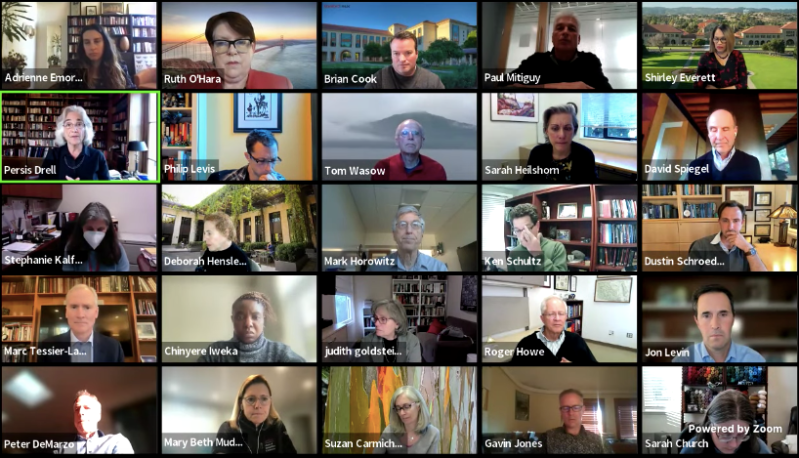Members of the Faculty Senate voted in favor of an amended motion establishing an anti-doxxing policy during their Thursday meeting. This motion was adapted from a recommendation brought forth during the last Faculty Senate session of fall quarter.
Senators called upon University administrators to establish a policy “consistent with Stanford’s core values and state and federal laws” to be brought before the Senate for review at a later time.
The voting results were nearly unanimous, with 42 votes in favor and one abstention.
Mark Horowitz Ph.D. ’84, vice chair of the Senate Steering Committee, introduced the reformed proposal, which was amended following “energetic discussion” at the previous Faculty Senate meeting. Associated Students of Stanford University Undergraduate Senator Marion Santo ’23 was invited by Horowitz to present the resolution passed by the Undergraduate Senate and the Graduate Student Council.
“We would like the Faculty Senate to take swift and unequivocal action to protect its students and faculty from the emotional and physical harm that comes from doxxing,” Santo said, adding that the Faculty Senate’s prior failure to pass the motion on doxxing “was a failure to redress the continued harm perpetrated by Stanford community members against other Stanford community members.”
Santo also noted that the student councils called on the Faculty Senate to “revisit and revise recommendations presented by members of the Planning and Policy Board Subcommittee on Campus Climate” regarding doxxing.
Santo’s endorsement for drafting anti-doxxing legislation was echoed by several faculty members, including Provost Persis Drell, who stated that the administration plans to finalize the new policy for Faculty Senate review “by the end of this academic year.”
Mechanical engineering professor Juan Santiago labeled doxxing as “appalling,” but he did not as readily endorse the legislation as other faculty members, instead explaining that he believed the Fundamental Standard already included anti-doxxing language.
“There are state laws against doxxing, so why should we add to the Fundamental Standard this one case?” he said. “Is this issue more urgent to add specific wording than [adding] rape or drug abuse?”
Horowitz later said, “We’re just asking for the administration to come up with policies that would start to help mitigate doxxing,” rather than reform the Fundamental Standard.
Economics professor Michael Boskin then called for a revision of the amendment from stating that the anti-doxxing policy would be brought to the Senate “for review and endorsement,” to adding the word “possible” before “endorsement.” “I don’t know what they’re gonna come up with,” Boskin said. “So I can’t commit to that in advance.”
The motion to include “possible” in the amendment, along with the amendment itself, both passed nearly unanimously.
Report on the results of the Campus Climate Survey
Drell stressed the importance of the May 2021 Campus Climate survey, which 36% of the Stanford community filled out. Respondents included faculty, staff, students and postdocs.
The survey results were presented by Patrick Dunkley, Vice Provost for Institutional Equity, Access and Community and Brian Cook ’01, Director of Assessment & Evaluation from the Office of Institutional Research. Results found that many students of marginalized backgrounds have both found places of great support, but also faced many challenges.
According to Cook, around 70 to 80% of students across all races and ethnicities reported finding one or more welcoming spots on campus. He recognized the work of “community centers on our campus, staff and student affinity groups,” lauding the work “they have put in for a very long time at the University.”
Despite this, among African-American, American-Indian and Alaskan Native respondents, “nearly 50% of those populations that took the survey had found at least one place at Stanford where they felt marginalized or excluded,” Cook said.
Similarly, among gender marginzalized people, including self-identified gender queer and trans community members, over 70% reported encountering communities where they felt marginalized or excluded.
“We have infinite occurrences that people are not reporting. They’re not seeking help,” Dunkley said, describing the impact of these negative experiences when many students do not regularly report. “As many as 25% of people consider leaving Stanford as a result of these incidents.”
In response, Drell added that these issues cannot be ignored by the University community.
“I’m going to need each of your help to be able to fix that,” Drell said. “It is going to be very important for faculty to show they’re willing to learn and to change.”
